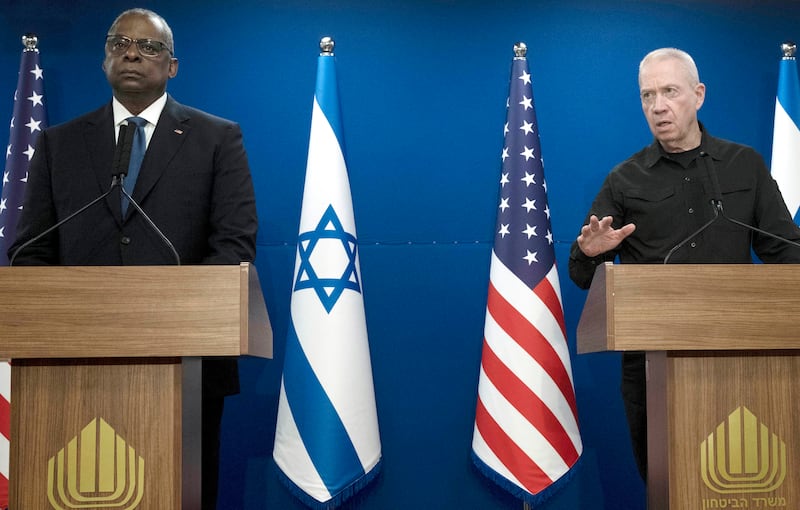US defence leaders met with Israel’s minister of defence as the United States warned against a ground invasion of the southern Gaza city of Rafah, but rising tensions between the two allies put any progress in question.
In remarks at the start of the Pentagon meeting, Defence Secretary Lloyd Austin said they would discuss alternative ways to target Hamas in Rafah, and he described civilian casualties in Gaza as “far too high” and aid deliveries as “far too low”.
But he also repeated the belief that Israel has the right to defend itself and the US would always be there to help.
Israeli Defence Minister Yoav Gallant, meanwhile, emphasised the ongoing threats to Israel, and said the meeting would address ways to destroy Hamas and get the Israeli hostages released, as well as plans to return displaced residents to their homes.

Mr Austin made no mention of threats to limit or condition future military aid to Israel on humanitarian gains, a growing sentiment among members of Congress and others.
And Mr Gallant only said that the meeting would include discussions about the important co-operation between the two countries to “ensure Israel’s military edge and capabilities”.
The meeting, which also included General CQ Brown, chairman of the Joint Chiefs of Staff, comes as tensions have spiked between the US and Israel, stemming from the widespread global frustration over the escalating humanitarian crisis in Gaza and political discord surrounding efforts to achieve a ceasefire.
On Monday, Israeli Prime Minister Benjamin Netanyahu abruptly cancelled a high-level visit to Washington this week in protest over the UN Security Council decision to call for an immediate ceasefire.
The US abstained, deciding not to use its veto power, and the resolution passed 14-0.
Israel says it cannot defeat Hamas without going into Rafah, where it says the group has four battalions composed of thousands of fighters. But US officials are pressing Israel to forego a ground invasion and consider other ways to defeat Hamas.
“There are ways to go about addressing the threat of Hamas, while also taking into account civilian safety. A lot of those are from lessons, our own lessons, conducting operations in urban environments,” Major General Pat Ryder, Pentagon press secretary, said on Monday.
“I would expect the conversations to cover those kinds of things.”
Israel’s offensive has killed more than 32,000 Palestinians, according to local health officials, and driven a third of Gaza’s population to the brink of starvation.
It was launched in response to Hamas’ October 7 attack on Israel, which killed some 1,200 people.
Hamas-led militants also took around 250 people hostage. They are still holding around 100 hostages, and the remains of around 30 others, after most of the rest were freed during a ceasefire last year in exchange for the release of Palestinian prisoners.
The Security Council resolution calls for a ceasefire during the Muslim holy month of Ramadan. Mr Netanyahu accused the US of “retreating” from a “principled position” by allowing the vote to pass without conditioning the ceasefire on the release of hostages.
The dispute signals an erosion in the US-Israel relationship that has been under a microscope for months as the military assault on Hamas continues, escalating the humanitarian crisis in Gaza.
White House national security spokesman John Kirby said the US was disappointed in the decision to cancel the delegation’s visit this week. He said the talks with Mr Gallant would likely include some of what the US had planned to discuss with the Israeli delegation on the possible Rafah invasion.
Mr Gallant met on Monday with Secretary of State Antony Blinken and national security adviser Jake Sullivan. Mr Kirby said those meetings, however, had not been intended as a replacement for the delegation meetings.









